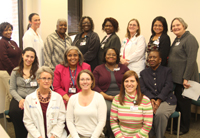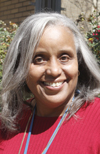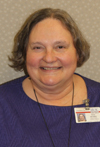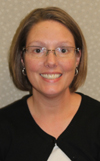|
by Hollen
Dodds
Public Relations
March is
National Social Work Month, a time
to celebrate the more than 600,000
social workers throughout the
nation.
 Social workers at
MUSC include Mary Catherine
Dubois, Kelly Finke, Polly McCann,
Crysta Schaff, Patricia Roberts,
Sarah Bishop, Neomi Brown, Kesha
Graham, Eanna Aaron, Sherrell
Nelson, Rena Bligen, Joyce
Rivers-Miller, Peggy Willis,
Tiombe Plair, Elena Bell, Cinnamon
Kera, Mary Elizabeth Gunter, Mela
Khedouri, Erin Courtney and
Jessica Metz. Social workers at
MUSC include Mary Catherine
Dubois, Kelly Finke, Polly McCann,
Crysta Schaff, Patricia Roberts,
Sarah Bishop, Neomi Brown, Kesha
Graham, Eanna Aaron, Sherrell
Nelson, Rena Bligen, Joyce
Rivers-Miller, Peggy Willis,
Tiombe Plair, Elena Bell, Cinnamon
Kera, Mary Elizabeth Gunter, Mela
Khedouri, Erin Courtney and
Jessica Metz.
Social workers
help people in all stages of life,
from children to the elderly, and
provide assistance to families
dealing with multiple issues.
Social workers are in schools,
courtrooms, drug clinics,
hospitals, senior centers,
shelters, nursing homes and other
areas.
Of the many
social workers on MUSC's campus,
The Catalyst has highlighted some
thoughts of health care social
workers in their profession.
Patricia
Roberts — Rutledge Tower Adults
Clinic (geriatrics)
 What are some new
projects going on in social work
at MUSC? What are some new
projects going on in social work
at MUSC?
The university internal medicine
is doing a weekly
multidisciplinary meeting to
examine more effective ways of
serving our patients. I am excited
to be a part of a team that is in
keeping with MUSC Excellence.
Elena Bell
— Hollings Cancer Center
 What is something
people probably don't know about
social workers? What is something
people probably don't know about
social workers?
We each go through extensive
training programs based on the age
group and type of people we work
with. It takes time to develop the
skills and proficiency necessary
for this field of work.
Kelly
Finke — Inpatient Maternity
 What is your hope
for social work in the future? What is your hope
for social work in the future?
My hope is that we can continue to
provide people with the tools to
access community resources for
assistance.
Kesha Graham — University
Hospital Adult Intensive Care
Unit
 What is the most
difficult part about working in
trauma? What is the most
difficult part about working in
trauma?
You can't prepare for a trauma. I
am the first person making the
call to a patient's family
informing them of a terrible
situation, and that's never easy
to do.
Mary
Catherine Dubois — Ashley River
Tower Digestive Disease Center
 What do you think
people would be surprised to
know about your job? What do you think
people would be surprised to
know about your job?
How often I am thanked for my
efforts as a social worker. Many
people think that our job goes
unnoticed, but I feel so
appreciated.
Rena
Bligen — Continuative Care
 Why do you feel
people need social work the most
after being discharged? Why do you feel
people need social work the most
after being discharged?
Sometimes people's lives are more
difficult at home. Many people
don't know where they will be
going after discharge. It is my
job to follow up with them after
they have been discharged and I
want to make sure they are being
taken care of properly.
|



 Social workers at
MUSC include Mary Catherine
Dubois, Kelly Finke, Polly McCann,
Crysta Schaff, Patricia Roberts,
Sarah Bishop, Neomi Brown, Kesha
Graham, Eanna Aaron, Sherrell
Nelson, Rena Bligen, Joyce
Rivers-Miller, Peggy Willis,
Tiombe Plair, Elena Bell, Cinnamon
Kera, Mary Elizabeth Gunter, Mela
Khedouri, Erin Courtney and
Jessica Metz.
Social workers at
MUSC include Mary Catherine
Dubois, Kelly Finke, Polly McCann,
Crysta Schaff, Patricia Roberts,
Sarah Bishop, Neomi Brown, Kesha
Graham, Eanna Aaron, Sherrell
Nelson, Rena Bligen, Joyce
Rivers-Miller, Peggy Willis,
Tiombe Plair, Elena Bell, Cinnamon
Kera, Mary Elizabeth Gunter, Mela
Khedouri, Erin Courtney and
Jessica Metz.  What are some new
projects going on in social work
at MUSC?
What are some new
projects going on in social work
at MUSC?  What is something
people probably don't know about
social workers?
What is something
people probably don't know about
social workers? What is your hope
for social work in the future?
What is your hope
for social work in the future? What is the most
difficult part about working in
trauma?
What is the most
difficult part about working in
trauma? What do you think
people would be surprised to
know about your job?
What do you think
people would be surprised to
know about your job? Why do you feel
people need social work the most
after being discharged?
Why do you feel
people need social work the most
after being discharged?